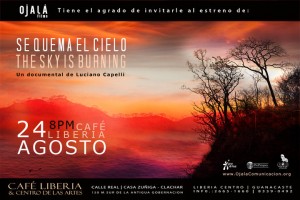The Sky Is Burning!
The alarms sounded some decades past about diminishing rainforests and the worldwide implications, but dry rainforests were overlooked. In his new documentary “Se Quema El Cielo”, Luciano Capelli waves the banner for all to see. The film focuses on the plight of the Guanacaste tropical dry forest, documenting the struggle to preserve over three hundred thousand species of life. One method is to recreate the natural habitat in the area, from the Pacific coastline to the chain of volcanoes Rincon de la Vieja and Orosi, covering lowlands and highlands. Much of this area was pastureland for centuries. One major problem rose when the cattle were removed around 1977 leaving non-indigenous grasses that were planted as feed to squeeze out local plant life. This is how a downhill chain begins because once the native plants disappear, so does the wildlife that depends on them. Without natural enemies, the grasses took over, dried out and became kindling for natural fires due to lightning, controlled fires, mismanaged campfires and even fires set as arson. Historic winds also play a major role.
The film documents the effort by ranger controlling fires and restoring natural habitat. They recognize part of the problem is lack of education so have gone into the classrooms and taken the classrooms into the park. There is some great footage of students and teachers in streams, identifying various life forms.
Luciano Capelli is a photographer, filmmaker and author of various documentaries for Italian Public Television. His work has been televised in many countries worldwide. Capelli came to Costa Rica in 1987. In 1993 Luciano was awarded the Premier Costa Rican Film honors for his documentary “El Paisaje Olvidado” (The Forgotten Landscapes) and three years later directed “El Barco Prometido” (The Promised Ship) winning many honors, including Best Documentary in the Muestra de Cine y Video Costa Rica 2000 and a special award at the Festival Icaro in Guatemala. In 2001, his film “Algo Queda” (Something Remains) gained awards for Best Costa Rica Production, Best Direction and Documentary at the Festival ICARO and special mention at the Toronto Film Festival.
As noted in this film, the area is “not an island in a safety net” but relies on surrounding ecosystems to survive, a kind of companion survival. Luciano used several photographers, two with underwater expertise and their footage made clear to me the idea about this area depending with its environmental neighbors. The sequence devoted to Santa Elena Bay, Murcielago Island and surrounding coral graveyards says it all.
Filming this documentary took eighteen months. Along with pre and post production time, we are looking at a lengthy commitment by Luciano Capelli to get the word out about an area on the brink of irrevocable negative change. The film makes it clear that a positive change won’t happen overnight and education is a critical initial step. The documentary comes with Spanish and English subtitles, telling me Capelli wants to educate as many people as possible with his work. The beginning of our commitment is to watch “Se Quema El Cielo”. Your perception of Guanacaste landscapes will be changed when you do.


